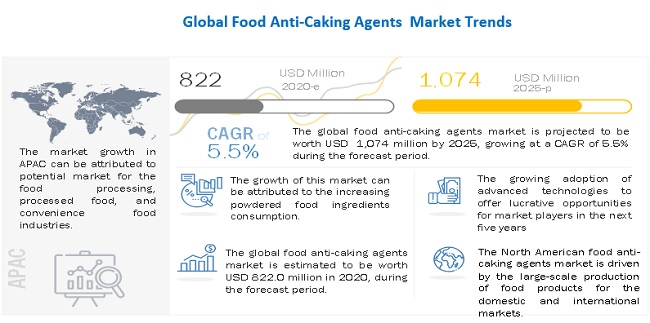According to MarketsandMarkets, the global food anti-caking agents market size is estimated to be USD 822 million in 2020 and is projected to reach USD 1,074 million by 2025, at a CAGR of 5.5% during the forecast period. The market is primarily driven by factors such as the growing consumption of snacks and bakery items in the developing countries, preservation of end product value of food products, ease of transportation and packaging safety of powdered ingredients.
Download PDF brochure: https://www.marketsandmarkets.com/pdfdownloadNew.asp?id=3259107

Anti-caking agent, also known as flow aid, is a food additive that enables powders or granulated materials to flow freely. The additive prevents agglomeration in certain solids by adsorbing excess moisture, or by coating particles and making them water repellent, enabling a free-flowing condition. Some of the common examples of food products containing anti-caking agents include table salt, milk powder, baking powder, cake mixes, grated cheese, and instant soup mixes among others. Besides the basic functionality of moisture adsorption, anti-caking agents such as microcrystalline cellulose are used for additional functionalities as well; as a binder, stabilizer, and as a bulking agent. The regions such as Europe, North America and Asia-Pacific markets show increasing trends for consumption of ready-to make flour mixes,and uniquely seasoned and flavoures snack products.
The silicon dioxide segment is estimated to account for the fastest growth in the food anti-caking agents market during the forecast period. Silicon dioxide is added during food preparations (food product manufacturing) in order to prevent food ingredients from binding together. Common food applications for silicon dioxide include salt, dry mixes, icing sugar, and chili powder. The spices sprinkled on the chips (snacks) also contain silicon dioxide which helps to enhance taste. The Food and Drug Administration (FDA), World Health Organization (WHO), European Food Safety Authority (EFSA), Food Standards Australia & New Zealand (FSANZ) and other regional and local regulatory bodies have recognized silicon dioxide as a safe additive in food.
The seasonings and condiments segment by application is estimated to achieve the fastest growth in the food anti caking agents markets market, as seasonings and condiments are being largely since the pandemic outbreak through home cooking. The stock up behavior of the populations globally further drove the sales of this market. The quality of the products was highly considered as the seasonings and condiments would be soted for acetain period before use.Thus the market for anti-caking agents in the segment is expected to grow.
Make an Inquiry: https://www.marketsandmarkets.com/Enquiry_Before_BuyingNew.asp?id=3259107
The Asia Pacific region is estimated to account for the fatsest growth in the global food anti-caking agents market in 2020. The rising income, purchasing power, rapid growth of the middle-class population, and consumer demand for processed products present promising prospects for growth and diversification in the region’s food anti-caking agents sector. These trends and preferences have created a conflict in the need for new categories of food anti-caking agents, as opposed to the resistance to the use of food anti-caking agents, especially of chemical origin. The high demand for convenience foods has implications on the food anti-caking agents categories required to prevent the clumping and prevention against lumps or caking in products.
Key Market Players
Key players in this market include include major players such as Evonik Industries AG (US), PPG Industries, Inc. (US), Brenntag AG (Germany), Univar Solutions Inc. (US), Solvay SA (Belgium), Cabot Corporation. And Agropur Ingredients (US). These major players in this market are focusing on increasing their presence through expansions & acquisitions. These companies have a strong presence in North America, Asia Pacific and Europe. They also have manufacturing facilities along with strong distribution networks across these regions.